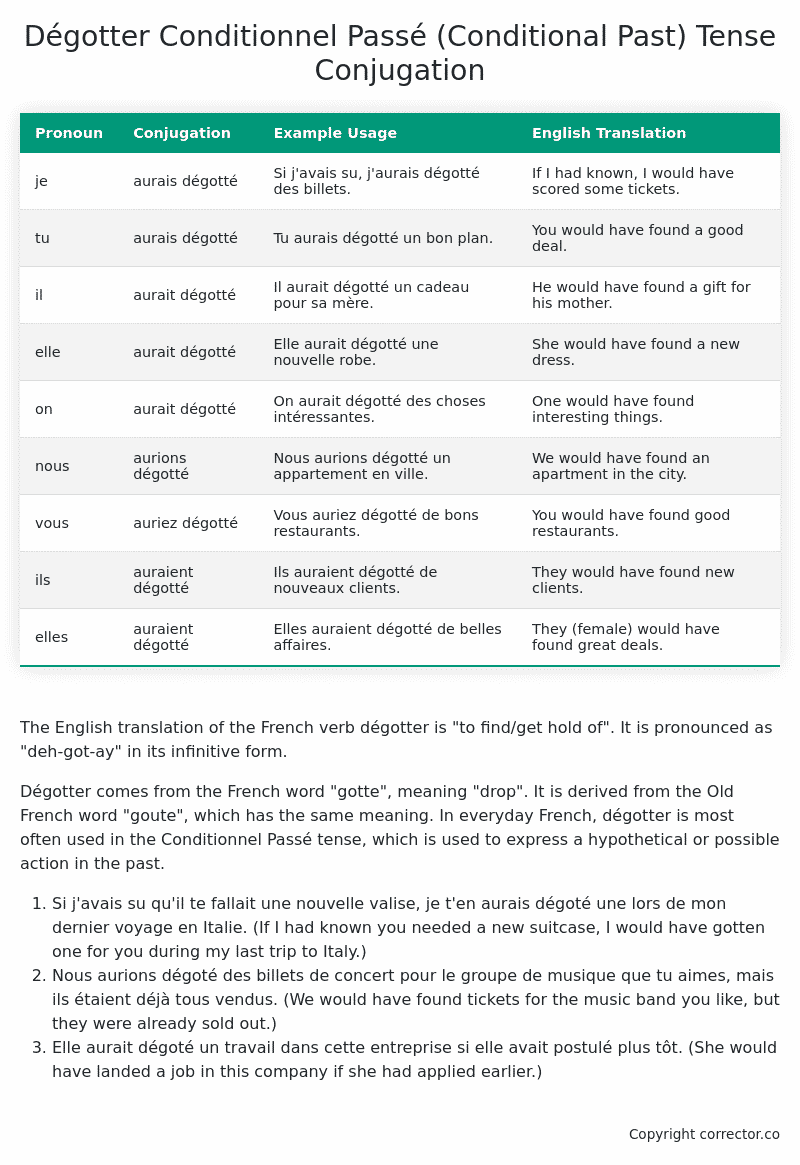Conditionnel Passé (Conditional Past) Tense Conjugation of the French Verb dégotter
Introduction to the verb dégotter
The English translation of the French verb dégotter is “to find/get hold of”. It is pronounced as “deh-got-ay” in its infinitive form.
Dégotter comes from the French word “gotte”, meaning “drop”. It is derived from the Old French word “goute”, which has the same meaning. In everyday French, dégotter is most often used in the Conditionnel Passé tense, which is used to express a hypothetical or possible action in the past.
- Si j’avais su qu’il te fallait une nouvelle valise, je t’en aurais dégoté une lors de mon dernier voyage en Italie. (If I had known you needed a new suitcase, I would have gotten one for you during my last trip to Italy.)
- Nous aurions dégoté des billets de concert pour le groupe de musique que tu aimes, mais ils étaient déjà tous vendus. (We would have found tickets for the music band you like, but they were already sold out.)
- Elle aurait dégoté un travail dans cette entreprise si elle avait postulé plus tôt. (She would have landed a job in this company if she had applied earlier.)
Table of the Conditionnel Passé (Conditional Past) Tense Conjugation of dégotter
| Pronoun | Conjugation | Example Usage | English Translation |
|---|---|---|---|
| je | aurais dégotté | Si j’avais su, j’aurais dégotté des billets. | If I had known, I would have scored some tickets. |
| tu | aurais dégotté | Tu aurais dégotté un bon plan. | You would have found a good deal. |
| il | aurait dégotté | Il aurait dégotté un cadeau pour sa mère. | He would have found a gift for his mother. |
| elle | aurait dégotté | Elle aurait dégotté une nouvelle robe. | She would have found a new dress. |
| on | aurait dégotté | On aurait dégotté des choses intéressantes. | One would have found interesting things. |
| nous | aurions dégotté | Nous aurions dégotté un appartement en ville. | We would have found an apartment in the city. |
| vous | auriez dégotté | Vous auriez dégotté de bons restaurants. | You would have found good restaurants. |
| ils | auraient dégotté | Ils auraient dégotté de nouveaux clients. | They would have found new clients. |
| elles | auraient dégotté | Elles auraient dégotté de belles affaires. | They (female) would have found great deals. |
Other Conjugations for Dégotter.
Le Present (Present Tense) Conjugation of the French Verb dégotter
Imparfait (Imperfect) Tense Conjugation of the French Verb dégotter
Passé Simple (Simple Past) Tense Conjugation of the French Verb dégotter
Passé Composé (Present Perfect) Tense Conjugation of the French Verb dégotter
Futur Simple (Simple Future) Tense Conjugation of the French Verb dégotter
Futur Proche (Near Future) Tense Conjugation of the French Verb dégotter
Plus-que-parfait (Pluperfect) Tense Conjugation of the French Verb dégotter
Passé Antérieur (Past Anterior) Tense Conjugation of the French Verb dégotter
Futur Antérieur (Future Anterior) Tense Conjugation of the French Verb dégotter
Subjonctif Présent (Subjunctive Present) Tense Conjugation of the French Verb dégotter
Subjonctif Passé (Subjunctive Past) Tense Conjugation of the French Verb dégotter
Subjonctif Imparfait (Subjunctive Imperfect) Tense Conjugation of the French Verb dégotter
Subjonctif Plus-que-parfait (Subjunctive Pluperfect) Tense Conjugation of the French Verb dégotter
Conditionnel Présent (Conditional Present) Tense Conjugation of the French Verb dégotter
Conditionnel Passé (Conditional Past) Tense Conjugation of the French Verb dégotter (this article)
L’impératif Présent (Imperative Present) Tense Conjugation of the French Verb dégotter
L’infinitif Présent (Infinitive Present) Tense Conjugation of the French Verb dégotter
Struggling with French verbs or the language in general? Why not use our free French Grammar Checker – no registration required!
Get a FREE Download Study Sheet of this Conjugation 🔥
Simply right click the image below, click “save image” and get your free reference for the dégotter Conditionnel Passé tense conjugation!

Dégotter – About the French Conditionnel Passé (Conditional Past) Tense
Formation
Common Everyday Usage Patterns
Expressing Unreal Past Scenarios
Polite Requests or Suggestions
Expressing Doubt or Uncertainty
Interactions with Other Tenses
Conditional Present
Indicative Past Tenses
Conditional Future
Summary
Want More?
I hope you enjoyed this article on the verb dégotter. Still in a learning mood? Check out another TOTALLY random French verb conjugation!


